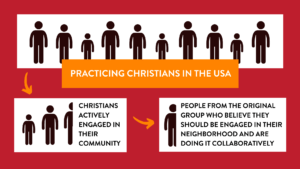By Milan Homola
The phrase “better together” sometimes comes across as wishful thinking or an empty progressive platitude. But I believe that for Jesus followers, this is not only a biblical command, but a compelling challenge. For Christians, “better together” is a way of summarizing the reality of a “body with many parts” or the fact that the “dividing wall of hostility has been torn down” and in its place we find “one new humanity in Christ” (Ephesians 2). We aren’t granted the luxury of putting collaboration and oneness on the spectrum of liberal vs conservative. Rather, we have to look inside our hearts: are we aligned with the prayer of Jesus in John 17–or not?
“I in them and you in me–so that they may be brought to complete unity. Then the world will know that you sent me and have loved them even as you have loved me.” (John 17:23)
I’m passionate about this topic because God called me out of darkness when I was 19 and gave me a mission: help churches work together to serve and love their neighbors. My goal in this blog is to help any Jesus follower who wants to lead or participate in local missions/outreach in their own neighborhood. A recent study put out by Barna Group* will help us all do that. It includes insightful data about Christians who engage in their community and the impacts of working collaboratively.
This study uses survey data to tell a story. It’s a story about Christian engagement in our neighborhoods and cities.
The Barna Study’s Findings: Christian Community Engagement
Put simply: There are “practicing Christians” (one quarter of American adults) in communities all around the country. Of those “practicing Christians,” 26% are the kinds of Christians who are volunteering or actively serving in their community. This segment (the focus of the study) are called “community participants” (CPs). These community participants (CPs) are “adults who gather with multiple other people multiple times for some level of local influence.”
Now let’s dive into a few topics from the study that will help any Christian who wants to lead or participate in local missions/outreach in their neighborhood.
-
The significance of being collaborative
-
The power of shared passion
The Significance of Being Collaborative
The study dove into smaller segments of these CPs, one of which they called “collaborative.” The segment is small though, so follow along with this visual: imagine 10 people standing in a row in front of you. Those 10 people represent all practicing Christians in the USA. Now ask 7 ½ of those people to leave the room (never mind the half person visual). You are left with 2 ½ people. According to the study, those are the Christians who are engaged actively in their community (CPs). Now take away 1 ¾ more people from those 2 ½. You are left with ¾ of a person. That’s how many people out of the original 10 practicing Christians believe they should be engaged in their neighborhood AND they are doing it collaboratively…not even a whole person.

If you are a Christian who wants to serve in your neighborhood, it is essential to work collaboratively with other churches/Christians in your community. From John 17 we know this is the way the body of Christ grows and displays the love of God.
Compassion Connect’s mission is to unite churches to love and serve their neighbors in the name of Jesus with His compassion. We believe that Jesus’ prayer in John 17 is his heart and as the Church our ministry, mission, and local outreach ought to reflect that heart.
“Those who believe and act in ways aligned with the Kingdom of God (valuing unity and living out compassion in their neighborhood) consistently feel more effective in their community engagement.”
For us, “collaboration” means local churches in a neighborhood see themselves as The Church of the neighborhood and they are in relationship together as they pray and discern God’s moves for that neighborhood.
Consider these benefits that follow those who work collaboratively, according to Barna:
- The collaborative community continually scored their scope of impact higher than any other group of CPs.
- 100% of collaborators said they were benefiting their own community, compared to 75% of other CPs
- Collaborators were more likely to say their impact reached their own nation and even beyond to the world.
The Consequence of Collaboration
As you engage in your community consider this reality summarized from the data:
Those who believe and act in ways aligned with the Kingdom of God (valuing unity and living out compassion in their neighborhood) consistently feel more effective in their community engagement.
As you, your friends, and your church rightfully pursue works of community engagement in the name of Jesus, ask yourself questions like these:
- When considering local missions is collaboration a messy optional approach or an essential perspective for living out the realities of the body of Christ?
- Do you believe that collaboration leads to a broader more healthy impact on your neighborhood? If yes, what are you doing to advance that way of doing things?
The Power of Shared Passion
We know passion is a motivator, but do we know how much it matters?
If you are a leader in the church you probably work with volunteers, organize teams, and think a lot about what motivates people. This segment of the study is super helpful when considering how to care for and motivate volunteers.
Here is a hypothetical and then I will apply some learnings from the study that have helped me and may help you.
You want to organize a group of Christians to do something of value in your community. That’s a great goal. You decide to do your homework in order to understand the pillars that make for a successful group. Conventional wisdom may feed you foundational concepts like “ownership” or “buy-in.” You wouldn’t have been wrong, but the Barna study powerfully shows there is something head and shoulders above those concepts: it’s passion.
It’s passion for a cause that people need to share, be reminded of, and know they are working toward. Passion is the most important pillar for a successful group of Christian community participants.
The Data:
- Having passion and values in common is 2x more important for group members than having ownership or having “a say” in the group!
- 80% of CPs who were part of a group with shared passions said they experienced spiritual growth because of their participation.
These two points are immensely helpful for all of us wanting to make a difference in our communities. First, it shows that we don’t have to get lost in the confusing minefield of ownership. Instead let’s assume, as followers of Jesus, we treat people with the dignity and respect they inherently have as image bearers of God, and then the focus can be more on igniting and refocusing on the shared passions of the group.
Second, there is a correlation between spiritual growth and working together with fellow believers who have similar passions. We ought to lead and participate in our communities with that truth in mind. We have been greatly encouraged by our amazing volunteers who embody this truth:
“We had three kinds of churches and the style and personality of each church was different. The churches learned from each other and adjusted to each other. There’s something about serving together that helps us grow. We were reminded of the simple faith we have in common.”
“Compassion Clinics opened my eyes that there can be people [from other churches] who love Jesus too, and can even be more in tune than I am. My church doesn’t necessarily have all the right answers. I learned about that in seminary, but had never experienced it until I lived it in Compassion Clinics.”
“We’re such small churches [in our area] we HAVE to communicate and collaborate. We don’t really have a choice. But it allows us to dream bigger than we otherwise would be able to.”
Does that mean you will have a big impact by simply gathering the group and talking about passion over and over? No.
Successful groups still need to have structure, leadership, and focus. Even though individual members don’t necessarily feel they need to have control or ownership in all the decisions, Barna found that:
- 87% agree the group has to be well organized
- 89% said the group has to be able to make effective decisions.
Finding and Keeping Passion
The next time you put effort into leading a group or joining a group make sure you have passion as a key metric. Ask yourself questions like these:
- Is the passion of the group clear and celebrated regularly?
- Am I participating in this group because I’m passionate about its focus?
Unity Comes from Patient Endurance
I want to encourage you to consider the future of The Church as described in scriptures. There is a banquet scene, but not before there is division, pain, and suffering. We know that the enemy seeks to divide the Church and prevent the loving truth of the Gospel from advancing. Now and into the future scriptures point us to “patient endurance.”
That is the lifestyle we are to practice and build. That is the context upon which the banquet scene culminates. It’s silly to imagine that worldly divisions between charismatic personalities and dogmatic denominations will prevail into that final scene. Rather, it is patient, loving, charitable endurance that prepares us for that feast.
When we work in collaboration with other followers of Jesus “across the aisle” our life is a statement.
When our service shines with passion for the justice and way of God we are practicing patient endurance.
On the other hand, when we isolate and impersonally engage our communities we allow atrophy to build in our fellowship muscles.
But you are not like that. You wouldn’t be reading this blog if you were and you certainly wouldn’t make it down here to the end. You are part of the royal priesthood of believers who practices today what will be normal tomorrow in the final Kingdom. My hope is that the small points of data, stories, and quotes help encourage you onward in that practice of love and good deeds.
Milan Homola
* I personally, and we as an organization, want to extend our deepest sympathies to David Kinnaman (President of Barna) and his family. During the writing of this blog I received an email with the news that his wife Jill had passed from this life to the next. May the God of grace comfort him and his kids now and through the many tomorrows when the pain of loss is poignant.


